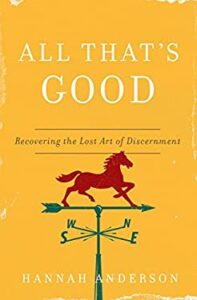 Takeaway: Discernment is about practice, wisdom, and intention.
Takeaway: Discernment is about practice, wisdom, and intention.
For regular readers of my reviews, it will be repetitive to say that Christianity is not just about being saved from our sins and going to heaven. It is also about abundant life on earth now. When Jesus gave his commission after the resurrection, he said, “Make disciples” in Matthew. Evangelism is essential, but it is the start, not the end, of the great commission.
Hannah Anderson is continuing this exploration of discipleship that she started in her earlier two books with a focus on discernment in All That’s Good. The blurb on the back of All That’s Good says in part, “Discernment is more than simply avoiding bad things; discernment actually frees you to navigate the world with confidence and joy by teaching you how to recognize and choose good things.”
I so much appreciate that Hannah Anderson starts All That’s Good with an exploration of a vision for goodness, “…in trying to keep myself safe, in obsessing over making the “right” choices, I found myself making a whole lot of wrong ones. Because I lacked a vision for goodness, I also lacked discernment.” (page 12)
The main section of All That’s Good (pages 63 to 154) is an extended meditation on Philippians 4:8, “whatever is true, whatever is noble, whatever is right, whatever is pure, whatever is lovely, whatever is admirable”, ”if anything is excellent or praiseworthy”, ”think about such things.” (NIV) In many ways (all good), this feels like the type of meditation on scripture that Eugene Peterson writes. It isn’t a word-for-word bible study; it is a practical exploration, not just the biblical concepts of the passage, but also of what that means to how we live our lives.
The practice of discernment as it is explored is not primarily thought of as a spiritual gift given to some (although that is one aspect of discernment for some people) but a skill developed over time. That skill, along with necessary components of humility, wisdom, virtue, the correct understanding of goodness, not just the avoidance of evil but the knowledge of good, and a touch of shrewdness, allows us to see the world around us rightly.
In many ways, this type of skills development focused on in All That’s Good is part of what it means to work toward discipleship, as illustrated in a larger community of thought and writers. James KA Smith in You Are What You Love, Stanley Hauerwas’ The Character of Virtue, Alan Noble’s Disruptive Witness, Alan Jacob’s How to Think, Christena Cleveland’s Disunity in Christ, Karen Swallow Prior’s On Reading Well, and many more are all trying to get Christians to pay attention to spiritual development, virtue, and character as a necessary component living well as a Christians right now.
Theologically, I keep running across people who seem to think that any intention in spiritual growth is somehow dependent on “works” instead of God’s grace for our salvation. It is no more dependent on “works” to focus on spiritual development than it is bad for a piano or football player to practice. Undeveloped gifting is no more usable than not having any gifting at all. As is clear throughout All That’s Good, discernment is not simply about natural or developed skills but being open to seeing how the Holy Spirit works around us through the development and practice of virtue, character, and wisdom. Discernment is a result of being open to the Holy Spirit. This is why Anderson can say,
“In this sense, truth is holistic; it relies on both the material and immaterial. And it’s why Christians believe that divine intervention is necessary to perceive and understand truth. Christianity does not give us access to a “higher truth” so much as it gives us the moral integrity we need to embrace truth. Rather than relying on our own wits, Christians believe that the “eyes of [our] understanding” are enlightened as we submit ourselves to the One who is truth Himself. Humility ”not little gray cells” makes us wise.
I encourage you to follow Hannah Anderson on Twitter, and I listen to her podcast with Erin Straza Persuasion. She is thoughtful and practices what she writes about well. I will reread this, likely soon.
All That’s Good: Recovering the Lost of Art of Discernment by Hannah Anderson Purchase Links: Paperback, Kindle Edition, Audible.com Audiobook